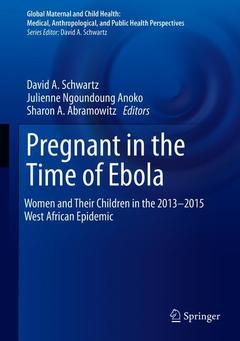Pregnant in the Time of Ebola, 1st ed. 2019 Women and Their Children in the 2013-2015 West African Epidemic Global Maternal and Child Health Series
Coordonnateurs : Schwartz David A., Anoko Julienne Ngoundoung, Abramowitz Sharon A.

This comprehensive account of the deadliest Ebola outbreak in history examines its devastating effects on West Africa?s most vulnerable populations: pregnant women and children. Noted experts across disciplines assess health care systems? responses to the epidemic in Liberia, Guinea, and Sierra Leone, emphasizing key areas such as pregnancy, prenatal services, childbirth, neonatal care, and survivor health among pregnant and non-pregnant women. The 30 chapters hone in on gender-based social issues exacerbated during the outbreak, from violence against women and girls to barriers to female education. At the same time, chapters pinpoint numerous areas for service delivery and policy improvements for more coordinated, effective, and humane actions during future pandemics.
A sampling of the topics:
- Ebola virus disease: perinatal transmission and epidemiology
- Comprehensive clinical care for children with Ebola virus disease
- Maternal and reproductive rights: Ebola and the law in Liberia
- Ebola-related complications for maternal, newborn, and child health service delivery and utilization in Guinea
- The Ebola epidemic halted female genital cutting in Sierra Leone?temporarily
- Maternity care for Ebola at Médecins Sans Frontières centers
- Stigmatization of pregnant women with and without Ebola
- Exclusion of women and infants from Ebola treatment trials
- Role of midwives during the Ebola epidemic
Pregnant in the Time of Ebola is a powerful resource for public health specialists, anthropologists, social scientists, physicians, epidemiologists, nurses, midwives, and governmental and non-governmental agency staff studying the effects of the epidemic on women and children as a result of the most widespread Ebola outbreak to date.
Is the first book (and potentially only book) to discuss the effects of the 2013-2015 West African Ebola epidemic on women, pregnancy, infants, and children
Is the authoritative book in this field, due to the wide range of expertise of the authors, together with the central role that they and their institutions played during the Ebola epidemic
Is unique in using a combined multi-specialty approach to the problems and potential solutions of the Ebola virus outbreak in West Africa, incorporating the opinions of internationally known experts in clinical medicine, anthropology and the social sciences, public health, epidemiology, midwifery, nursing, and other fields
Includes experts from Europe and the United States, as well as local West African experts who were directly involved in the outbreak
Includes the viewpoints and experiences of authors from multiple international agencie
Is comprehensive, with 30 chapters that include numerous illustrative photographs, figures, maps, and diagrams all dealing with issues regarding women (both pregnant and non-pregnant), infants, and children in Guinea, Sierra Leone, and Liberia during the Ebola epidemic
s who were deployed to the outbreak, including UNICEF, Partners in Health, Médecins Sans Frontières (Doctors Without Borders), International Rescue Committee, the U.S. Centers for Disease Control and Prevention (CDC), National Health Service of Great Britain, UNFPA, The Carter Center, and others
Addresses issues of importance to the care of women and their children during a multinational epidemic of a life-threatening infectious disease. These include biomedical complications of pregnancy, access to obstetrical care, maternal and infant clinical outcomes, effects of the epidemic on healthcare for non-pregnant women, birthing roles, roles of anthropologists and social scientists, gender-based violence and obstetrical violence, stigmatization, training and use of midwives and traditio
Date de parution : 01-2019
Ouvrage de 487 p.
17.8x25.4 cm
Disponible chez l'éditeur (délai d'approvisionnement : 15 jours).
Prix indicatif 147,69 €
Ajouter au panierThèmes de Pregnant in the Time of Ebola :
Mots-clés :
ebola virus disease (EVD) epidemic; women's reproductive health; pregnancy complications and risks; West African women and children; emergency response; maternal morbidity and mortality; childbirth and delivery; developing countries; obstetrics; maternal health; ebola treatment center; emerging infections; infant health; infectious disease epidemiology; gender violence; global public health; infant morbidity and mortality; midwifery; traditional and skilled birth attendants; medical anthropology; maternal and child


